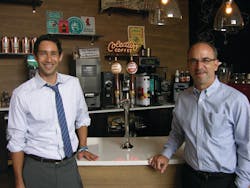The worst kind of limits are self-imposed. They are also the hardest to break through, making the vending, micro market and office coffee service operation formally known as the Classic Group so unique. Partners Michael Klong and Jim Carbone were able to broaden their ideas of coffee service in order to break their own limits and do what other vending and OCS providers have not – to think outside the box. The Classic Group, now named XXXXX to better encompass all the company offers, has grown from a small, family-run amusement and vending company to a 40-employee operation that includes servicing high-end espresso machines and distributing coffee to area supermarkets.
Klong and Carbone have grown the Chicago, IL-based business from $1.5 million in sales to $10 million in 7 years. They are in front of the trends and grabbing business with service, sales, experience and the variety of their offerings. “There’s no company that does what we do,” said Carbone about the services and products offered by the company.
An amusing history
Michael Klong started full-time in the vending business immediately after college in 1999. His mother was running a small amusement company making $150,000 a year. Klong, with the help of a business partner, purchased her outright. “I knew we couldn’t work together then,” said Klong with a laugh, as his mother now works in the accounts receivable department of the operation. Klong incorporated the company in 2000 and grew the services and clientele into vending and OCS in 2005.
It was during this time that Klong met Jim Carbone. Carbone had been selling vending equipment for a number of years. He worked for Atlas Distributing, then branched out on his own to form an equipment distributing company called, Pro Vending. He sold that company to Betson Distributing in 2005. He got to know Klong well during that time and after briefly trying his hand at the convenience store business, Carbone returned to vending and joined Klong as a business partner at the Classic Group in 2007.
Klong and Carbone decided to sell the amusement segment. “Amusement is a different business,” said Carbone. “You need to specialize in it.” After divesting the amusement business, the pair refocused the company on vending and OCS, which led them straight to some less traditional revenue generating opportunities in the coffee market.
Focus on customer needs
Coffee — as the major growth area of the company — came naturally to both Klong and Carbone. It was something they both felt passionate about and was growing in sales revenue.
“Vending has grown as well, and it is very important to us, but when we got into coffee we wanted there to be more differentiating aspects about our company,” said Carbone. That was one reason that the company came up with two brands, the Classic Group for the vending, micro market and OCS side and then Chicago Coffees and Teas for the restaurant and café side. “What appeals to an office is different than a café,” said Klong.
Chicago Coffees and Teas took the company from classic OCS to specialty coffee, including third wave roasters. “That’s the trend, that’s the future,” said Klong. Third wave refers to a new surge in artisan roasters. Klong and Carbone are exclusive distributors of many third wave roasters in the Chicago area, including Metropolis, Collectivo and Stumptown’s cold brew. Being distributors means also supplying these products in bulk to restaurants and supermarkets in addition to offering them to offices. Tea has been another large seller on the bulk product side. Klong and Carbone are distributors for Milwaukee, WI-based Rishi teas, an award winning brand. “Tea does so well, it’s crazy how many SKUs we have of it,” said Carbone. Most of the tea the Classic Group sells is to retailers and restaurants.
The company’s main advantage with forming these exclusive partnerships has been their dedication to service. “When we’re working for partnership, they need to feel comfortable we can produce what we say we will,” said Klong. That includes providing quality products, timely delivery and, most importantly, the proper equipment servicing.
“Service is really important to the coffee side of the business,” said Carbone. “There is someone on-call and working 24/7 at our operation, including holidays.”
“Chicago’s Coffee and Teas significantly improved what was already a high level of service for the Classic Group,” Klong added. In fact, the service end of the business is growing. Klong and Carbone have made arrangements with several equipment suppliers to provide equipment maintenance in the Chicago area. That includes restaurants and cafes using the equipment as well as large offices, that don’t use the Classic Group’s vending, OCS or micro market service. Many of these locations can’t wait until the next day for equipment to be repaired, so the service department has been a positive selling asset for Klong and Carbone.
Providing good service isn’t just about having on-call technicians who may also be trained baristas, but also in training the location on the care and cleaning of the equipment. “When you brew into dirty thermals, the coffee will taste burnt,” said Klong. That’s why the company sends and bills out cleaning supplies to the customer on a regular schedule, to maintain quality consistency and promises kept to the roasting partners.
Growth in bean-to-cup brewers
For the last 10 years, Klong and Carbone have been switching customers from liquid coffee to bean-to-cup systems. The two cite reasons such as bean-to-cup is more environmentally friendly, there are better margins for operators, it produces a better cup of coffee and the plentiful variety of really good coffee for the bean-to-cup machines.
“Most coffee pots need 3 to 4-ounces of ground coffee,” said Carbone. “Artisan roasters are not going to manufacture a 1.5 to 2.5 ounce frac pack.” He adds that they aren’t going to make a cartridge-style coffee package either.
Quality equipment service and third wave roasts aren’t the only nontraditional coffee service options Klong and Carbone offer. Some locations have bins of snacks such as chocolate covered cranberries, dried mangos and cashews. Most of the product in this category were items requested by a single location. Once Klong and Carbone added it to one location, they began offering it to all similar locations as an available option. “There’s a list of things [food and beverages] that companies like Google are offering their employees. Other tech companies need to offer them as well in order to remain competitive,” said Klong.
Micro markets
The Classic Group recently started offering micro markets, promoted as Fresh Select. While growth in their micro market business has been slow, there are markets with a lot of potential. Klong and Carbone have found offering freshly made muffins in pastry cases or offering a barista in the market in the morning a few times a week are very successful in certain micro market locations.
The company does not operate a commissary to make food for the micro markets, but uses a third party. The fresh food is delivered to the micro markets the same day it is delivered to warehouse.
Technology helps
All this couldn’t be done without technology. The Classic Group has been a partner with Crane’s Steamware for many years, which added an additional software component to help the Classic Group handle the third party logistics of a wine distributor that subleases part of the warehouse. In 2014, the Classic Group also updated warehouse technology to include the mobile Lightspeed application and a zoned warehouse. “Pickers start with vending, then OCS then specialty coffee,” said Carbone. “Four people pick for 1 ½ hours. Before it used to take between 4 to 6 hours.”
The Classic Group added a bar code reader to the picking system as a way to ensure the correct product was pulled. “You have to pick it right,” said Klong. “The bar code system is crucial to the customer experience.”
The company has been prekitting routes for 9 years and uses remote machine monitoring to make the prekits more accurate. The company also uses handhelds.
Most of the Classic Group’s vending machines are no older than 10 years, according to Carbone. Old machines are retired and the company purchases new machines for new locations. They have started introducing cashless payment options as well and have them available on about 250 machines.
Putting it all together
The Classic group offers a lot and focuses on a high-end clientele. That means overcoming pricing objections, especially in the OCS environment.
“Price is always an issue,” admits Klong, “even for companies like Google. We talk about what we offer. We are a mile from downtown. We are about experience and solutions.” The goal is to get the location to think about what will increase productivity in the office and offer the proper product lineup.
“We have a good grasp of what the employee is looking for and what the company has to offer to entice the level of employee they want,” added Klong. It’s a strategy that has served the Classic Group well. With the addition of other revenue generating channels like service and wholesale distributing, the Classic Group has a broad revenue strategy to ensure future success.
Operation Profile:
Year founded: 1999
Headquarters: Chicago, IL
Owners: Michael Klong and Jim Carbone
Number of employees: 42
Number of routes: 12
Software providers: Crane Streamware, Lightspeed, USA Technologies
Annual sales: $10 million
More than just a warehouse
In 2013, Michael Klong and Jim Carbone were outgrowing the 10,000 square-foot warehouse space they had been renting to operate The Classic Group. They were focused on expanding their coffee and tea segment with Chicago’s Coffee and Teas and needed a special type of location. They found it an old factory building. They renovated the 50,000 square foot space with warehouse shelves, loading docks, offices and a temperature-controlled, locked storage area that would be leased to a wine distributor.
The building is a mile from downtown, a good selling point, and has a special coffee-shop like main entrance. “We wanted to do something that no one’s done that would turn heads,” said Carbone. That was the idea behind the coffee show room which includes cold brew coffee on tap, a high-end espresso machine and everything you need to make it a training space for local coffee and tea suppliers, restaurateurs and hotel operators who need to train staff. The Classic Group allows partners to use the space free of charge. And employees use it for refueling during the day. “We are proof productivity increases when you have good coffee around,” said Klong.
Sales focused
The Classic Group hasn’t grown by services alone. Klong and Carbone know a good sales staff is imperative. “We aren’t just waiting around for the phone to ring,” said Carbone. “Good sales people are key. There are other companies 4 or 5 times our size with only 1 or 2 sales people. We have 4, plus Michael and myself.”
All the Classic Group sales staff are trained baristas as well, but specialize in different areas, such as in restaurants or vending and office coffee. This means that depending on the location, salespeople will often double up on a meeting. “It’s definitely a team environment,” said Klong.
About the Author

Emily Refermat
Emily Refermat began covering the vending industry in 2006 and served as editor of Automatic Merchandiser from 2012 to 2019. To reach the current editor of Automatic Merchandiser and VendingMarketWatch.com, email [email protected].
